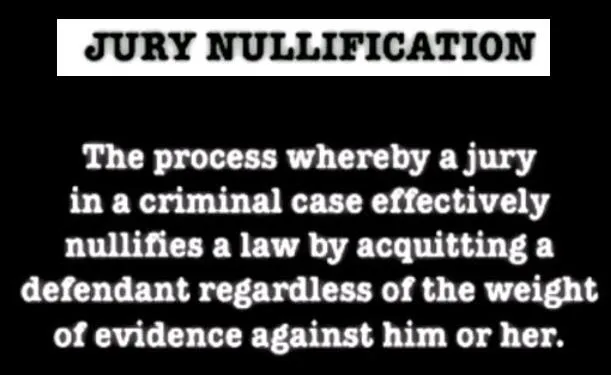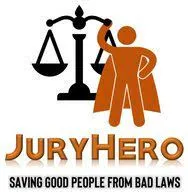Introduction
As both the Federal as well as State governmental agencies expand their attempts to regulate cryptocurrencies, the legal mechanism of jury nullification will once again reach to the forefront to combat injustice. The more Federal and State governments feel threatened by cryptocurrency, the more they will attempt to restrict, control, and attack all of the transactional freedoms cryptocurrencies afford.
We do not as yet know the hell governmental regulation may reign down on crypto. It may take several forms: oppressive and overburdensome KYC requirements; taxation to a degree it constitutes punishment; hellish applications of the Travel Rule; outright cryptocurrency banning; confiscations like occurred with gold in the 1930's by Executive Order 6102; or some yet undreamed remedy dragged up from the abyss. But whatever form it takes my friends, the day it arrives draws near.
Ultimately, once these antagonistic regulations are enacted, legal cases will commence all starting in the Trial Courts. And in Criminal Cases appearing on the dockets of the Trial Courts, Defendants (those involved in cryptocurrency) are constitutionally afforded their right to a trial by jury. At this point, the juries become the last stand for the transactional freedoms crypto affords. Enter the concept of 'jury nullification' to save the day.
What the Hell is Jury Nullification
You never heard Perry Mason, Jack McCoy or Arnie Becker talk about jury nullification? Never watched a TV Show or Movie where jury nullification was even mentioned? Hell, three years of Law School and it was never mentioned? So, what is 'jury nullification'.
Jury nullification, best defined as making a verdict null and void, is a constitutional doctrine which allows juries to acquit criminal defendants who are technically considered “guilty”, but their perception is that they do not deserve punishment, based upon their conscience. Jury nullification is best defined as when a jury reaches a verdict contrary to the judge’s instructions as to the law.
[Common Legal Questions. What is Jury Nullification?. (Accessed April 8, 2022)].
Or, in simpler terms:
You see, we have always been taught that it is a jury's job to faithfully listen to all of the evidence presented at trial. Furthermore, when all of the evidence is presented, the Judge then instructs the jury (known as charging the jury) on how to interpret the evidence under the law and how to arrive at their verdict. But 'jury nullification' gives jurors the opportunity to disregard the law, disregard the Judge's instructions, and return a verdict following the juries conscious.
Is 'Jury Nullification' Constitutional?
In a word - ABSOLUTELY !
In the United States, it has been long established the a Trial Judge may vacate a defendant's guilty verdict and enter an acquittal where the conviction runs contrary to the facts of the case applied to the law. However, the converse of this is not permitted. A Trial Judge has no authority or right to vacate a jury verdict of 'not guilty' and enter a guilty verdict in its place. "As soon as a judge has the power to find guilt in favor of the State in a criminal trial, the purpose of juries ceases to exist except as mere window dressing — a status that the Constitution will not allow [Crossman, C. What Bitcoiners Need to Know About Jury Nullification In A Hostile Legal System. (Accessed April 8, 2022)].
Given the foregoing, if a jury listens to evidence which depicts a clear violation of the underlying law (clear guilt), but, exercises its conscious finding the law unconscionable, the jury may nullify the law in the case in question by returning a 'not guilty' verdict, and there is nothing the Trial Judge can do about it.
So Does Jury Nullification Run Contrary to the Concepts of the 'Rule of Law'?
In a word (although hotly contested by the legal scholars) - NO !
Even among supporters, then, nullification is justified by
acknowledging the limits of the rule of law, in which the application of general rules to specific cases sometimes yields unsatisfactory results. To achieve one of law's ends-justice-we must sometimes abandon law's means, such as rule application. Like equity, nullification is one way, under this approach, to correct the imperfections of the rule of law and, when wisely used, to achieve justice in an individual case that rule application would not achieve.
[Brown, D. Jury Nullification within the Rule of Law. (Accessed April 8, 2022); see also, Butler, P. Racially Based Jury Nullification: Black Power in the Criminal Justice System. (Accessed April 8, 2022)].
Historical Applications of Jury Nullification
The most famous nullification case is the 1735 trial of John Peter Zenger, charged with printing seditious libels of the Governor of the Colony of New York, William Cosby. Despite the fact that Zenger clearly printed the alleged libels (the only issue the court said the jury was free to decide, as the court deemed the truth or falsity of the statements to be irrelevant), the jury nonetheless returned a verdict of "Not Guilty."
Jury nullification appeared at other times in our history when the government has tried to enforce morally repugnant or unpopular laws. In the early 1800s, nullification was practiced in cases brought under the Alien and Sedition Act. In the mid 1800s, northern juries practiced nullification in prosecutions brought against individuals accused of harboring slaves in violation of the Fugitive Slave Laws. And in the Prohibition Era of the 1930s, many juries practiced nullification in prosecutions brought against individuals accused of violating alcohol control laws. More recent examples of nullification might include acquittals of "mercy killers," including Dr. Jack Kevorkian, and minor drug offenders.
[Linder, D. Famous Trials - Jury Nullification. (Accessed April 8, 2022)].
However, not all of the historical applications of jury nullification have been positive. Most notably in this regard: "the negative applications including some notorious cases in which all-white southern juries in the 1950s and 1960s refused to convict white supremacists for killing blacks or civil rights workers despite overwhelming evidence of their guilt" [Id].
Final Thoughts
What is certain is regulation of the cryptocurrency industry is on the horizon. As crypto is a threat to the legacy institutions and as well provides degrees of freedom distasteful to governmental units, some to most of the current wave of regulation to come will likely be overburdensome, overly restrictive, impossible to comply with, or just downright unconscionable.
We, the crypto enthusiasts, will be required to do our civic duty and serve Jury Duty. And as crypto is accepted more and more, the likelihood of a crypto enthusiast being selected to a jury grows.
[And for so long as the enthusiast going through jury questioning (voir dire) without spitting out they love Bitcoin, hate fiat, hate government regulation, or even believe in jury nullification as a mechanism to protect individual against unjust criminal laws, that enthusiast will be sitting on a jury hearing a crypto case. (Note, it is not being suggested to lie during voir dire, however, limiting responses and applying finesse should be used to get on the jury)].
Once on these juries in crypto cases, the enthusiasts become the last line of defense against antagonistic crypto laws. So learn what jury nullification is and keep it in the back of your mind. Your future may include a sitting jury deliberating an unjust crypto law, where the evidence points to guilt under the antagonistic law, and jury nullification is the only mechanism available to insure true justice is done.


